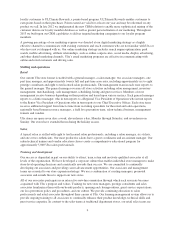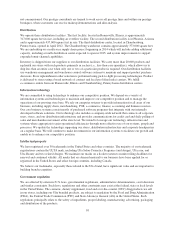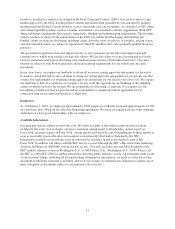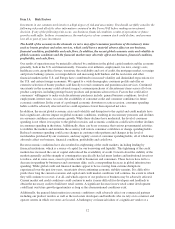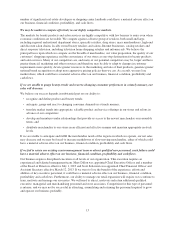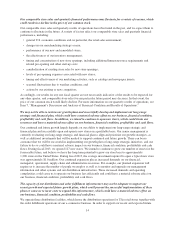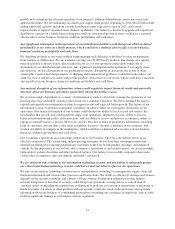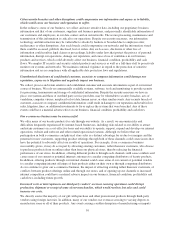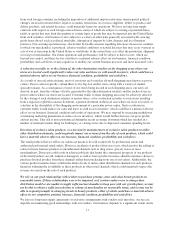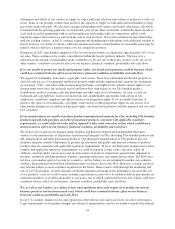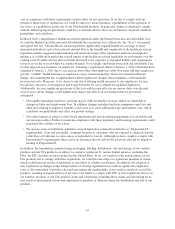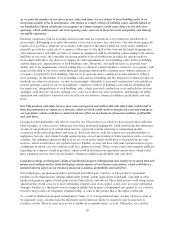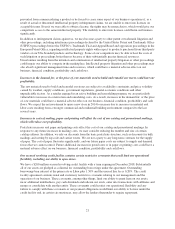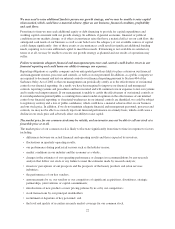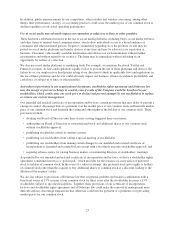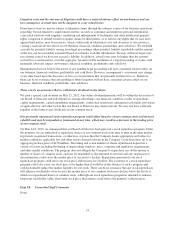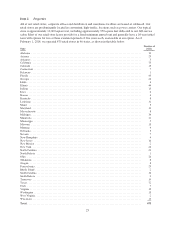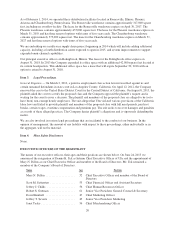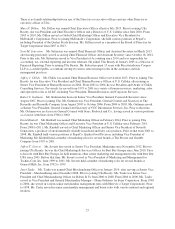Ulta 2013 Annual Report Download - page 23
Download and view the complete annual report
Please find page 23 of the 2013 Ulta annual report below. You can navigate through the pages in the report by either clicking on the pages listed below, or by using the keyword search tool below to find specific information within the annual report.cost of compliance with these requirements or their effect on our operations. If we fail to comply with any
present or future laws or regulations, we could be subject to future liabilities, a prohibition on the operation of
our stores or a prohibition on the sale of our Ulta branded products. In particular, failure to adequately comply
with the following legal requirements could have a material adverse effect on our business, financial condition,
profitability and cash flows:
In March 2010, comprehensive healthcare reform legislation under the Patient Protection and Affordable Care
Act and the Health Care Education and Affordability Reconciliation Act (collectively, the “Acts”) was passed
and signed into law. This healthcare reform legislation significantly expands healthcare coverage to many
uninsured individuals and to those already insured. Due to the breadth and complexity of the healthcare reform
legislation and the staggered implementation and uncertain timing of the regulations and lack of interpretive
guidance, it is difficult to predict the overall impact of the healthcare reform legislation on our business over the
coming years. Possible adverse effects include increased costs, exposure to expanded liability and requirements
for us to revise the ways in which we conduct business. For example, the Patient Protection and Affordable Care
Act has imposed new mandates on employers, including a requirement effective January 1, 2014 (which has been
extended to January 1, 2015 due to a recent executive order) that employers with 50 or more full-time employees
provide “credible” health insurance to employees or pay a financial penalty. Given our current health plan
design, and assuming the law is implemented without significant changes, these mandates could materially
increase our costs. Moreover, if we choose to opt out of offering health insurance to our employees, we may
become less attractive as an employer and it may be harder for us to compete for qualified employees.
Additionally, because significant provisions of the Acts will become effective on various dates over the next
several years, future changes could significantly impact any effects on our business that we previously
anticipated.
‰Our rapidly expanding workforce, growing in pace with our number of stores, makes us vulnerable to
changes in labor and employment laws. In addition, changes in federal and state minimum wage laws and
other laws relating to employee benefits could cause us to incur additional wage and benefits costs, which
could hurt our profitability and affect our growth strategy.
‰Our salon business is subject to state board regulations and state licensing requirements for our stylists and
our salon procedures. Failure to maintain compliance with these regulatory and licensing requirements could
jeopardize the viability of our salons.
‰We operate stores in California, which has enacted legislation commonly referred to as “Proposition 65”
requiring that “clear and reasonable” warnings be given to consumers who are exposed to chemicals known
to the State of California to cause cancer or reproductive toxicity. Although we have sought to comply with
Proposition 65 requirements, there can be no assurance that we will not be adversely affected by litigation
relating to Proposition 65.
In addition, the formulation, manufacturing, packaging, labeling, distribution, sale and storage of our vendors’
products and our Ulta products are subject to extensive regulation by various federal agencies, including the
FDA, the FTC and state attorneys general in the United States. If we, our vendors or the manufacturers of our
Ulta products fail to comply with those regulations, we could become subject to significant penalties or claims,
which could harm our results of operations or our ability to conduct our business. In addition, the adoption of
new regulations or changes in the interpretations of existing regulations may result in significant compliance
costs or discontinuation of product sales and may impair the marketability of our vendors’ products or our Ulta
products, resulting in significant loss of net sales. Our failure to comply with FTC or state regulations that cover
our vendors’ products or our Ulta product claims and advertising, including direct claims and advertising by us,
may result in enforcement actions and imposition of penalties or otherwise harm the distribution and sale of our
products.
19


